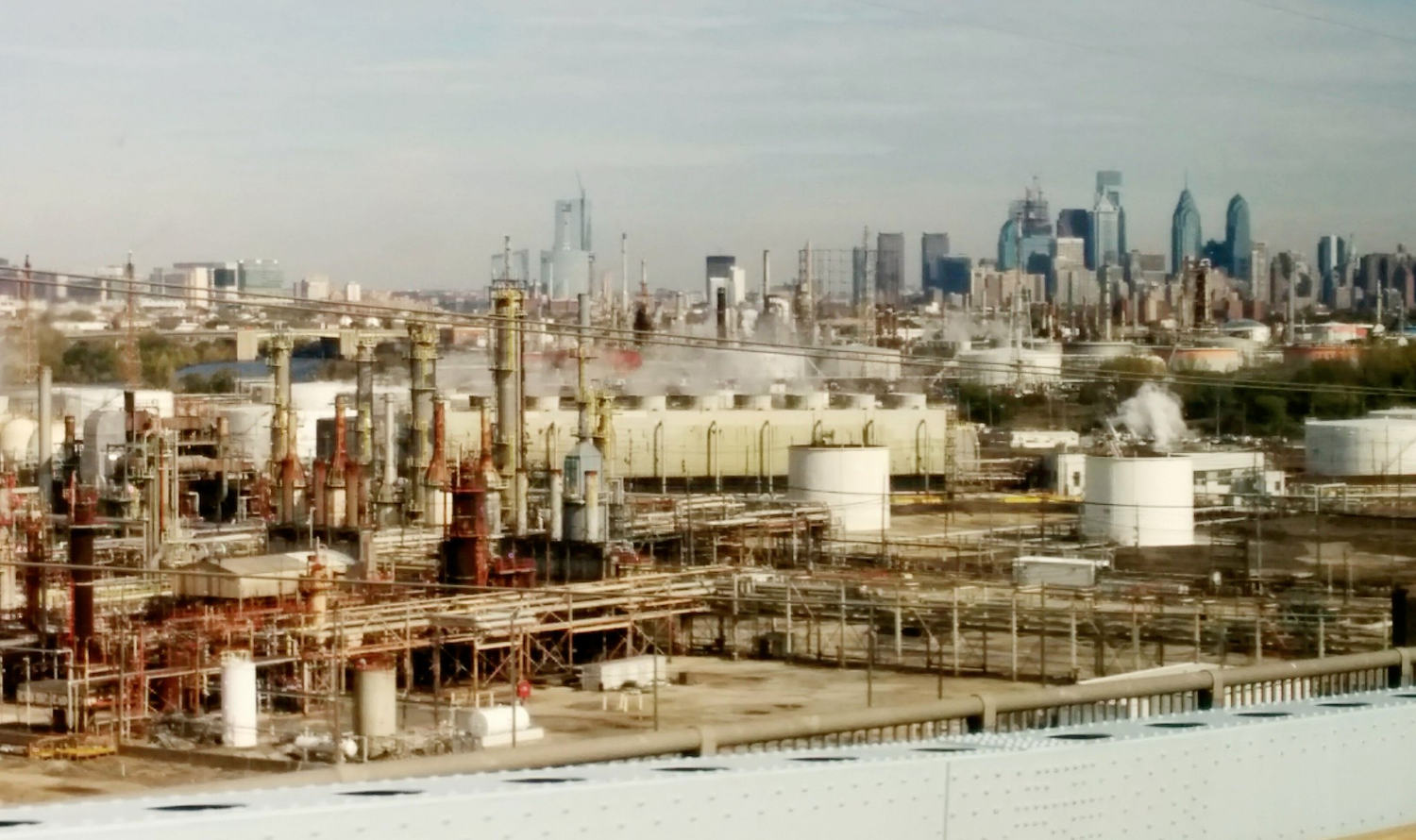
Remember when the largest oil refinery on the East Coast exploded? It’s been just over seven months since the June 21 explosion in Philadelphia, but the refinery is finally being dealt with in the aftermath of the blast. Supposedly caused by leaky pipes, the Philadelphia Energy Solutions refining complex released over 5,000 pounds of toxic hydrofluoric acid right into the heart of South Philly’s Grays Ferry neighborhood. In the days following the incident, the refinery closed down. Almost exactly a month later, the company filed for bankruptcy, raising questions about whether the refinery would be reopened, repurposed or remain closed. As of Jan. 22, a Chicago Hilco development company won the $240 million auction bid for the rights to acquire the former refinery and hopefully transform it into a renewable energy facility.
The PES complex originally served a bulk petroleum storage facility in 1866. By 1870, the facility started oil refinery operations, becoming a significant contributor to Philadelphia’s economic activity since. It should be no surprise that the economic benefits of such a large refinery came with its own environmental consequences, 150 years in the making.
“The refinery is the single largest source of particulate emissions in the city,” according to a 2017 report issued by Philadelphia’s Office of Sustainability, “and alone accounts for nearly 16 percent of Philadelphia’s carbon footprint, not including the fossil fuel products exported off-site.” There are even more environmental concerns about the grounds beneath the refinery itself. Over the years, toxic chemicals (including lead, gasoline and benzene) have contaminated the 1300-acre land the refinery occupies, making it difficult to repurpose the area for more heavy industry work.
As the threat of rising water levels increases, climate scientists fear that the area is also vulnerable to future flooding, meaning that those toxic chemicals will likely end up contaminating the Delaware River if not treated.
Aside from environmental concerns, the refinery’s continuous release of toxins had and continues to have a direct impact on the people living in the surrounding neighborhoods. A 2017 report released by activist group Philly Thrive states, “52.6 percent out of 314 respondents living near the refinery had one or more of the following health conditions: asthma, heart disease, cancer or another respiratory condition.” Moreover, the report also states that, of the 45,000 people living within one mile from the refinery, “71 percent were people of color and 32 percent were below the poverty line,” making the issue of the refinery future’s also a question of environmental justice.
Philly Thrive member Rodney Ray and former PES worker commented on his story to the Inquirer, stating, “My grandfather passed away from lung cancer. My grandmom, who lived three blocks from the refinery, passed away from cancer. My neighbor Ms. Sylvia has two daughters with cancer and she talks about the ‘silent killer’ creating an epidemic in our community. That is why the refinery needs to stay shut down. It had 150 years. We had to breathe this bad air for so long while the owners turned a profit — but nothing lasting for the community.”
Groups such as Philly Thrive and the city’s chapter of the Sunrise Movement have mobilized in recent months to fight against the reopening of the refinery by proposing “Right to Breathe” legislation to Mayor Kenney, as well as organizing citywide strikes and rallies to raise attention to the issue.
As much as the closing of the refinery was a temporary sigh of relief for the surrounding community and environmental groups, it caused a job crisis for over 1,000 Philadelphians laid off by the PES. In a shrinking oil refining market, these workers have struggled to find new well-paying jobs.
To reduce bankruptcy costs, the company also unfortunately dissolved its group health care plan. According to an article published by Reuters, liquidating the plan prevented workers from qualifying for temporary health coverage through the Consolidated Omnibus Budget Reconciliation Act (COBRA). The search for new jobs has become even more critical as the former workers find themselves without health care, especially as the majority of them are growing older in their fifties.
However, city officials expect that there will be more jobs and opportunities for these displaced workers as Hilco plans to remediate and repurpose the land for a potential renewable gas mission. Mayor Kenney said in a statement on Jan. 22, “[We] welcome the selection of Hilco Redevelopment Partners as the winning bidder for the refinery site. Though many challenges and years of work lie ahead, we are optimistic that the firm can develop this site in a way… that puts the public’s safety as a top priority, has a more positive impact on the environment, engages meaningfully with the surrounding communities, and contributes significantly to the region’s economy.”
In response to the refinery auction results, Philly Thrive released their own statement saying, “We claim this outcome as a partial victory, and yet Philly Thrive has no plans to scale down our organizing as the sale of PES is finalized. Our initial list of requests for Hilco Redevelopment Partners includes: no leasing land for refining operations, funding to assist the public with technical participation in clean up plans, active public involvement in plans for redevelopment, and a quota for quality, union jobs to surrounding neighborhoods.”
Based on the statements given by both the mayor and activist groups, it is highly likely that companies like Helco will be held accountable for their effects on the surrounding community and the environment. The chain of events since the refinery explosion demonstrate a new, unprecedented wave of resistance and activism towards the fossil fuel industry as climate change becomes more relevant in everyday lives.


